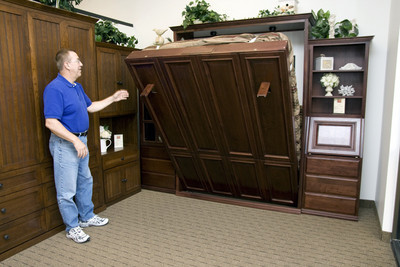Short on space?

Dan Wilding, vice president of marketing for his family’s Murphy bed business, Wilding Wallbeds out of St. George, Utah, chuckles when he thinks about the customer who invariably ends up at every furniture convention and home show watching his product demonstrations.
“Inevitably there’s always that guy in the background, his arms are folded and his chin is beneath his fingers, and he’ll finally walk over and say, ‘You know where that would be really useful? In one of those rooms where you don’t have much space and you really need a bed,'” Wilding said laughing. “A lot of people are just unaware that this solution exists.”
The original Murphy bed, in fact, has been around since the early 1900s, the invention of a California man named William L. Murphy who was trying to save space in his tiny one-bedroom apartment. But it’s hard to blame someone for stepping back and taking a second look when they see today’s versions of Houdini-like sleepers, whether it’s Murphy beds, pull-out sofas or even futons. The mattresses have improved, the mechanics are better and the outside shell, whether cabinet or couch, can be quite sophisticated.
In a Wilding Wallbeds’ showroom, off South Decatur Boulevard near the Las Vegas Beltway, giant, handmade cabinets made from woods like alder, oak and mahogany line the walls. Samples with raised panels and dovetailed drawers open as if they’re sliding on pads of butter. But pull up on what looks like little bas-relief panels and you release the wooden legs of the bed. Pull on the legs and, voilá, the mattress is slowly released to the floor on the arms of two pistons.
Suddenly a high-end piece of furniture nearly becomes an entire bedroom set with headboard, nightstands and even recessed lighting that changes settings with the click of a button. And don’t count on paper-thin mattresses. The offerings include everything from a twin-size Simmons Beautyrest to a $3,300 queen mattress by a company called Intellibed.
And truly putting the “home” in home office, the company offers a large wraparound wall bed unit that includes a corner desk, cabinets and shelves.
Sofa sleepers have also come a long way with the latest in fabrics and clean, contemporary designs. The home furniture and accessories company Room & Board has about 200 fabric choices for its sleepers, including classic weaves, velvets and microsuedes, as well as versions in soft leather. Combine this with the sleepers’ plump cushions and they look like they could fit in anywhere, from home office to living room.
The company also sells a version called the Comfort Sleeper that does away with some of the quirks of traditional sofa beds — including that pesky bar across the back of the mattress.
“Our Comfort Sleeper has no metal bar, a thicker mattress than the traditional sleeper and takes up less space because so much of the mechanism is built in back of the sofa,” said Angela Green, merchandising manager for Room & Board upholstering. “You also just grab a handle and walk back, and the mattress pulls right out.”
Green said the demand for sofa sleepers is growing as baby boomers begin to downsize and are looking for ways to accommodate guests in the home. “Our sales are showing that customers are looking for alternative solutions,” she said.
Jane Arason agrees. Arason and her husband, who live in Annapolis, Md., created a Murphy bed called the ZzZ Chest a few years ago to fulfill their own need to save space. Now they sell them through their company, Arason Enterprises Inc. The beds look like wooden chests of drawers or storage cabinets, but pull a handle and the front panel becomes a platform with a mattress unfolding on top.
Unlike a lot of Murphy beds, it doesn’t have to be bolted to a wall and it’s also relatively compact, which means it’s easy to move from place to place, Arason said.
“I think there are some trends here and we happen to have the product,” she said. “It’s filling a niche and the timing seems to be right for it because of downsizing. … The children have moved out, and there’s also a move to urban areas. Gas prices are driving a lot of people back to the cities.”
Finally, never underestimate the simplicity of a futon. According to Kamal Lalwani, president of Futons 4 Less, 7035 W. Sahara Ave., the fold-out beds are getting better all the time.
“They have come a long way. People are under the wrong perception that they are cheap, that they can buy them at Wal-Mart and other mass-merchandising retailers,” Lalwani said.
“Everything has changed: design, comfort, different finishes.”
The frames of metal or wood come in more styles and have extras such as built-in recliners, magazine racks, side tables and drawers for storage, Lalwani noted. The mattresses are also thicker, made with high-density foam or even inner springs, and all of the components of a futon — frames, mattress pads and mattress covers — can be purchased at the store.
“It’s like building your own customized furniture,” he said. “There’s no waiting.”












